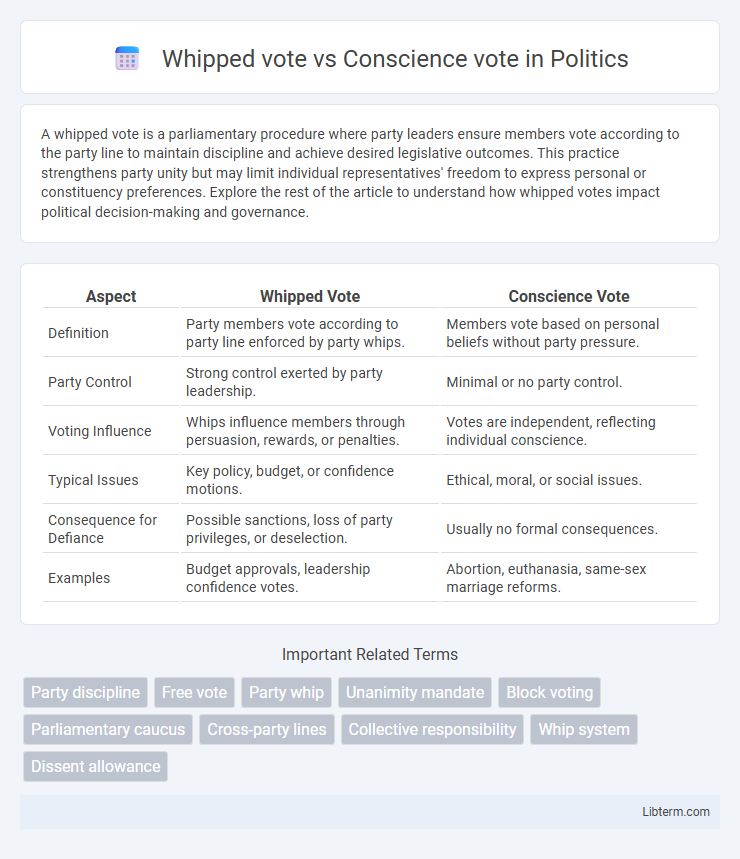A whipped vote is a parliamentary procedure where party leaders ensure members vote according to the party line to maintain discipline and achieve desired legislative outcomes. This practice strengthens party unity but may limit individual representatives' freedom to express personal or constituency preferences. Explore the rest of the article to understand how whipped votes impact political decision-making and governance.
Table of Comparison
| Aspect | Whipped Vote | Conscience Vote |
|---|---|---|
| Definition | Party members vote according to party line enforced by party whips. | Members vote based on personal beliefs without party pressure. |
| Party Control | Strong control exerted by party leadership. | Minimal or no party control. |
| Voting Influence | Whips influence members through persuasion, rewards, or penalties. | Votes are independent, reflecting individual conscience. |
| Typical Issues | Key policy, budget, or confidence motions. | Ethical, moral, or social issues. |
| Consequence for Defiance | Possible sanctions, loss of party privileges, or deselection. | Usually no formal consequences. |
| Examples | Budget approvals, leadership confidence votes. | Abortion, euthanasia, same-sex marriage reforms. |
Introduction to Parliamentary Voting Systems
Whipped votes in parliamentary systems require members to follow party lines under strict instructions, ensuring unity and discipline during crucial legislative decisions. Conscience votes, also known as free votes, allow members to vote based on personal beliefs without party pressure, typically used for ethical or morally sensitive issues. Understanding these voting types is essential to grasp the dynamics of party control and individual member autonomy within legislative processes.
Defining Whipped Vote: Party Discipline in Action
A whipped vote is a parliamentary procedure where party leaders enforce strict discipline, compelling members to vote according to party lines to ensure unified policy outcomes. This mechanism leverages party whips who monitor and direct members' voting behavior, maintaining cohesion and strategic consistency within the legislature. Whipped votes contrast with conscience votes, where members are free to vote based on personal beliefs without party pressure.
Understanding Conscience Vote: Freedom of Choice
Conscience votes grant legislators the freedom to vote according to personal beliefs rather than party lines, highlighting individual moral judgment in decision-making. This autonomy contrasts with whipped votes, where strict party discipline dictates voting behavior to maintain collective cohesion. Understanding the conscience vote underscores the importance of personal integrity and ethical considerations in legislative processes.
Historical Context: The Evolution of Voting Practices
Whipped votes originated in parliamentary systems where party discipline was crucial to maintaining government stability, historically evolving to enforce cohesive legislative agendas through party whips. Conscience votes emerged as a response to issues demanding moral or ethical considerations beyond party lines, historically reflecting growing recognition of individual lawmakers' autonomy. This evolution highlights the balance between collective political strategy and personal integrity in democratic decision-making processes.
Pros and Cons of Whipped Voting
Whipped votes enforce party discipline, ensuring unified voting that strengthens party influence and legislative efficiency, but they can suppress individual representative autonomy, limiting personal or constituent-driven decision-making. This system promotes clear policy direction and accountability within parties, yet it risks alienating voters who feel their representatives are merely following party lines rather than representing diverse interests. While whipped votes enhance cohesion, they may reduce the democratic expression of conscience and nuanced debate in parliamentary decisions.
Benefits and Challenges of Conscience Voting
Conscience voting allows legislators to vote based on personal beliefs rather than party lines, fostering genuine representation and ethical accountability. This practice can lead to more diverse perspectives in policymaking and reduce party polarization, enhancing democratic deliberation. However, conscience voting may challenge party cohesion and complicate legislative agendas, potentially slowing decision-making and creating internal conflicts.
Key Examples: Whipped Vote in Recent Legislation
Whipped votes in recent legislation, such as the UK's Brexit Withdrawal Agreement vote in 2019, demonstrate party leadership enforcing strict voting discipline to ensure uniformity and government stability. In contrast, conscience votes, often seen in matters like same-sex marriage laws or abortion rights in Canada and Australia, allow MPs to vote according to personal beliefs rather than party lines. The use of whipped votes in critical policy bills highlights the political strategy to maintain party cohesion and pass essential government measures efficiently.
Notable Cases: Conscience Vote in Parliamentary History
Notable cases of conscience votes in parliamentary history include the British Parliament's 1967 Sexual Offences Act, which legalized homosexuality, reflecting MPs voting based on personal beliefs rather than party lines. In Australia, the 2017 same-sex marriage postal survey led to a conscience vote in Parliament, resulting in the historic legalization of same-sex marriage. Canada's 1988 abortion law reform also saw a conscience vote, demonstrating instances where legislators prioritize ethical considerations over party discipline.
Impact on Democracy and Representation
Whipped votes enforce party discipline, often limiting individual legislators' ability to represent their constituents' specific interests, which can reduce the diversity of opinions in parliamentary decisions and potentially weaken democratic representation. In contrast, conscience votes allow elected officials to vote according to personal or constituency beliefs, enhancing democratic pluralism and providing a truer reflection of the electorate's varied views. The choice between whipped and conscience votes significantly influences the balance between party unity and authentic representation in democratic institutions.
The Future of Voting Practices in Modern Politics
Whipped votes enforce party discipline, ensuring unified decisions on key legislation, whereas conscience votes allow legislators to vote based on personal beliefs, reflecting individual accountability. The future of voting practices may lean towards increased use of conscience votes to enhance transparency and democratic representation amid diverse electorates. Emerging digital platforms and AI-driven analytics could further support nuanced voting behaviors, balancing party cohesion with individual moral judgment.
Whipped vote Infographic

 libterm.com
libterm.com